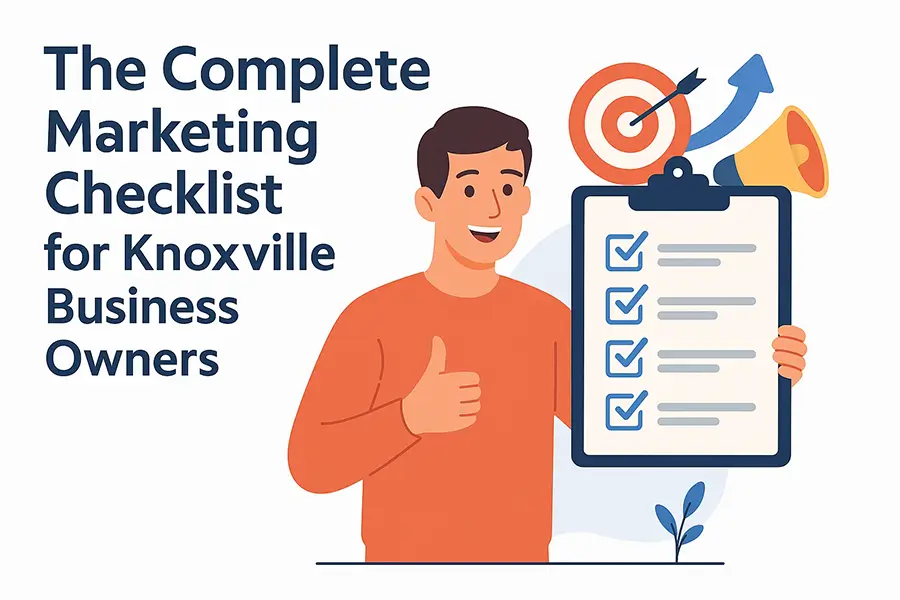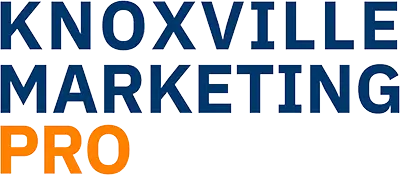Every Knoxville small business owner needs a solid marketing plan to reach more customers and grow their brand. This complete checklist covers the key steps any local business should follow to build a strong presence and get results. Readers will discover proven tactics and local tips that make a difference in today’s market.
Marketing can feel overwhelming, but this guide breaks it down into clear, manageable steps. Each item on the checklist is designed to help businesses in Knoxville stand out and make the most of their budget.
Whether someone is starting a new business or wanting to refresh their marketing strategy, this checklist provides the practical answers they need to move forward with confidence.

Foundations of Knoxville Small Business Marketing
Starting a small business in Knoxville means making important decisions early. These choices affect everything from taxes to how your business can grow.
Identifying Your Business Structure
Choosing the right business structure is a key step. Small business owners usually consider options like sole proprietorship, partnership, corporation, or LLC. Each has different legal and tax effects.
A sole proprietorship is the simplest way to start a business in Tennessee. There is no formal paperwork needed, but the owner is personally responsible for all business debts.
A partnership shares responsibility between two or more people. Like the sole proprietorship, partners are each liable for what happens in the business.
A corporation is more complex and has strict rules. However, it offers protection for personal assets. Owners (shareholders) are not personally responsible for debts or lawsuits against the business.
The LLC (Limited Liability Company) is popular for small businesses in Knoxville. It combines liability protection with simpler management and tax benefits. Owners are called members.
When deciding, consider:
- Liability: How much personal risk are you willing to take?
- Taxes: What tax rules fit your plans?
- Management: Who will run the business?
Developing a Solid Business Plan
A business plan is an important tool. It helps business owners set goals, attract investors, and measure progress. The Small Business Administration suggests every business write out a plan before opening their doors.
A good business plan should include:
- A description of your business and its products or services
- Market research focused on Knoxville and Tennessee
- An analysis of competitors
- Clear marketing and sales tactics
- An operational plan and organizational structure
- Financial projections, including startup costs and revenue
Strong business plans are clear and realistic. Use facts and actual data where available. Knoxville business owners should also think about local factors, like regional laws and customer needs.
Writing a plan takes time, but it gives structure to ideas and helps avoid problems later. Even sole proprietors in Tennessee benefit from this clear roadmap.
Registering Your Business Name
Registering a business name is required before marketing to customers. In Tennessee, owners file with the Tennessee Secretary of State and local offices for official approval.
Key steps:
- Choose a unique name not already in use in Tennessee.
- Check name availability using the Secretary of State’s online search.
- Register the name as part of your formation documents (for LLCs, corporations, or partnerships).
- DBA (Doing Business As): Sole proprietors or partnerships may need to file an “assumed name” (also called a trade name or DBA) with the county clerk.
- Get an EIN (Employer Identification Number): This is needed for opening a bank account or hiring employees.
The right business name sets the foundation for branding. Registering prevents others from using the same name in Tennessee and helps owners follow the law.
For further protection, some Knoxville businesses trademark their names at the state or federal level. This is an extra step but can be valuable for growth.
Legal and Financial Setup for Marketing Success
Setting up the right legal and financial structure is important for Knoxville business owners. These steps lay the foundation for secure operations, future marketing, and long-term growth.
Securing Tax Accounts and Permits
All Knoxville businesses must register with the Tennessee Secretary of State before starting operations, especially LLCs and corporations. Most companies also need an Employer Identification Number (EIN) from the IRS, which acts as a business tax ID and is often required to open tax accounts or hire employees.
Depending on the products or services offered, they may need city and county business licenses. For those selling goods, a Tennessee sales tax account is required, which can be set up at the Tennessee Department of Revenue website.
Some businesses, such as restaurants or those selling alcohol, require extra permits. It is recommended to check with both state and local agencies to avoid missing any steps. Operating without the correct licenses puts a business at risk for penalties or closures.
Protecting Your Brand and Avoiding Trademark Infringement
Every business should protect its brand from the start. Registering a DBA (Doing Business As) with the Tennessee Secretary of State is needed if using a name different from the company’s legal name.
Before choosing a business or product name, owners should search the USPTO (U.S. Patent and Trademark Office) and Tennessee state databases to make sure no one else is using it. This helps avoid trademark infringement which can lead to costly legal issues or forced rebranding.
Submitting a trademark application, whether at the state or federal level, gives extra legal protection and helps build a strong, clear brand identity in Knoxville and beyond. Owners can hire an attorney or use online resources for trademark registrations.
Opening a Business Bank Account
A separate business bank account keeps personal and company finances apart. Banks will require an EIN, the business’s official formation documents, and possibly a copy of the DBA certificate if the business uses a trade name.
Benefits of a business account:
- Improved accounting
- Easier tax filing
- Professional appearance
Most banks offer checking, savings, and sometimes merchant accounts for accepting card payments. Keeping all business income and expenses in one place helps with budgeting and makes it easier to review financial reports.
Understanding Sales Tax and Local Business Taxes
Most Knoxville businesses must collect Tennessee sales tax on goods and some services. After creating a sales tax account through the Tennessee Department of Revenue, business owners must collect the right rate and pay on time.
Sales tax rates can include both state and local rates. Business owners should regularly check the Department of Revenue’s tables to make sure they are charging the correct amount. A simple mistake may result in back taxes and fines.
Other local taxes, like business or gross receipts taxes, also apply. Keeping records and staying organized with due dates helps avoid late fees and ensures compliance with Tennessee tax law. Consider using software or hiring a professional for complex tax needs.
Building a Targeted Knoxville Marketing Strategy
To get results, a Knoxville small business needs a marketing plan built on real data. Focusing on the right audience, picking smart places to advertise, and working with local partners all help a business stand out and grow steadily.
Defining Your Target Audience
Every small business in Knoxville serves a specific group. Owners should start by asking, “Who will buy my product or service?” List out details like age, location, income range, and interests. This helps narrow down who is most likely to respond.
Use methods like simple surveys, customer interviews, or available census data for Tennessee. Check out who follows or interacts with the business’s social media. This gives clues about buying habits and popular times to reach people.
Mapping out a “customer profile” can guide all future marketing. For example:
| Demographic | Example |
|---|---|
| Age | 25–40 |
| Location | West Knoxville |
| Income | $40,000–$80,000 |
| Interests | Outdoor activities |
Understanding the audience means less wasted spending and stronger customer connections.
Selecting Effective Marketing Channels
Not every channel fits every trade name or product. Knoxville business owners should figure out where their customers spend time and focus there. Some common channels include:
- Social Media (Facebook, Instagram) for daily engagement
- Email Marketing for sharing news or deals
- Local Print Ads or Knoxville-specific magazines
- Google My Business and online directories
Testing different channels helps see what works best. For many, a mix of digital and local ads reaches the widest group. Tracking basic results—like how many people call or click—shows which efforts are paying off.
Small businesses should avoid using every channel at once. It’s more effective to start with one or two, learn, and then grow over time.
Leveraging Local Networks and Partnerships
Connections with other Knoxville businesses can make marketing easier and less expensive. Team up for joint events, shared giveaways, or cross-promotions. These partnerships widen reach and build trust in the community.
Look for groups like the Knoxville Chamber of Commerce or Tennessee small business meetups. Joining local business networks helps owners learn and find support. Creating a business plan that lists possible partners and goals for these team efforts gives structure and focus.
Examples of what works well:
- Hosting “Shop Local” weekends
- Swapping flyers or coupons
- Collaborating on social media posts
Small businesses grow faster when they help and promote each other.
Optimizing and Tracking Your Marketing Efforts
Consistency and measurement help Knoxville small business owners improve marketing success. Setting clear goals, reviewing results, and adjusting strategies keeps their business plan effective.
Setting Measurable Marketing Goals
Every small business should create specific, measurable goals for their marketing. Instead of saying “get more customers,” set goals like “gain 50 new email subscribers this month” or “increase foot traffic by 20%.” These targets make it easier to track progress.
Use the SMART framework:
- Specific
- Measurable
- Achievable
- Relevant
- Time-bound
For example, if a local bakery wants to grow, they might set a goal to increase weekly cupcake sales by 15% over the next quarter. A clear goal helps when picking the right tactics and tracking results.
Analyzing Marketing Performance
Once goals are set, tracking results is key. Small businesses can use tools like Google Analytics for website traffic or built-in insights on social media.
Key indicators to watch include:
| Metric | Why It Matters |
|---|---|
| Website Visitors | Shows online reach |
| Conversion Rate | Tracks leads or sales per visit |
| Cost per Lead | Measures if spending is efficient |
| Social Media Engagement | Checks content popularity |
Check these numbers often. For example, a Knoxville coffee shop might learn from weekly reports if new promotions actually boost sales or not.
Iterating Your Tactics for Growth
Not all marketing tactics will succeed on the first try. Adjusting strategies helps a business find what works best.
If a paid ad isn’t bringing new customers, test a different headline, offer, or platform. Small businesses should keep experimenting and tweaking their business plan.
Track changes and results in a simple table or spreadsheet. Review which marketing channels perform best, then put more budget and time into those. Regular reviews help avoid wasting resources and keep efforts focused on proven tactics.
